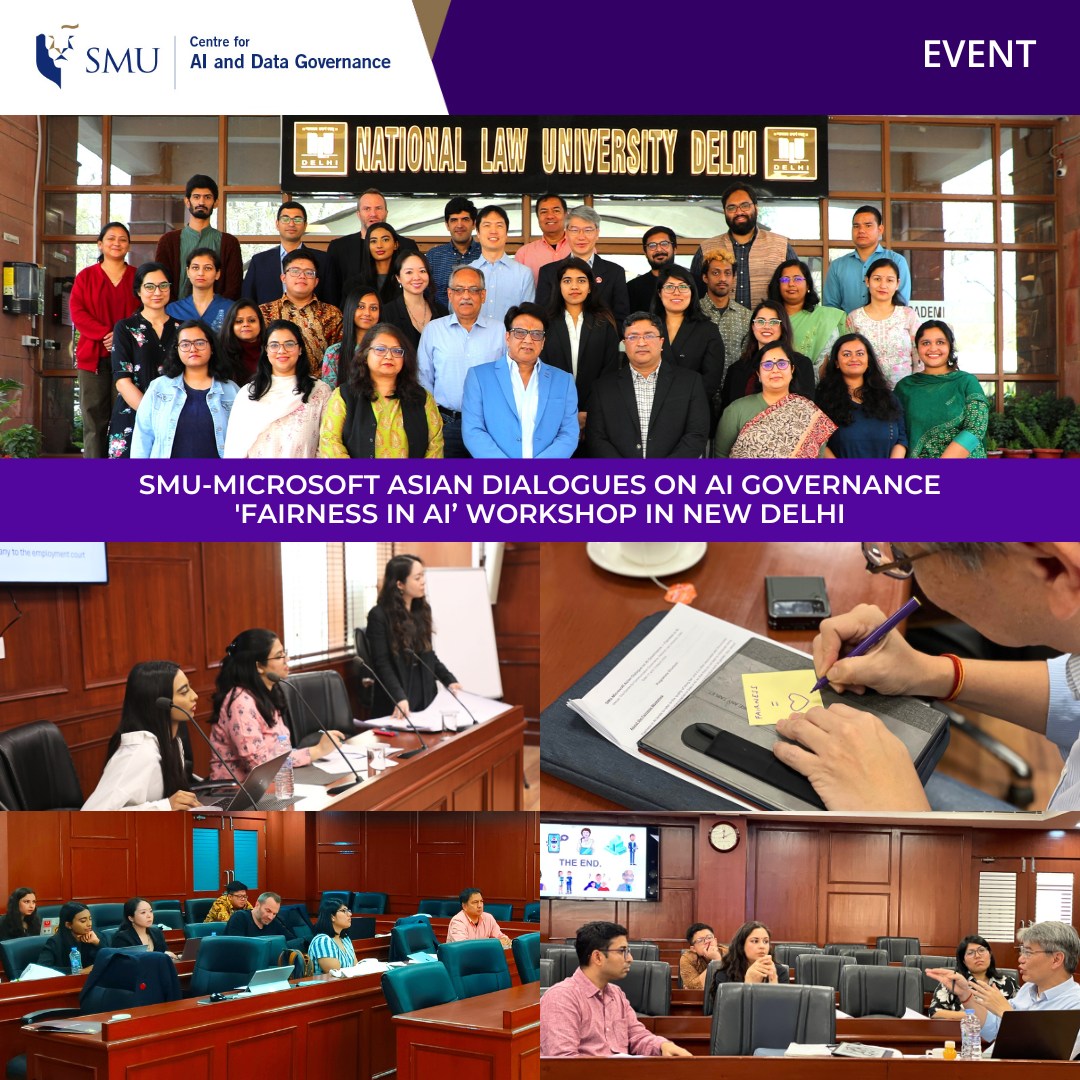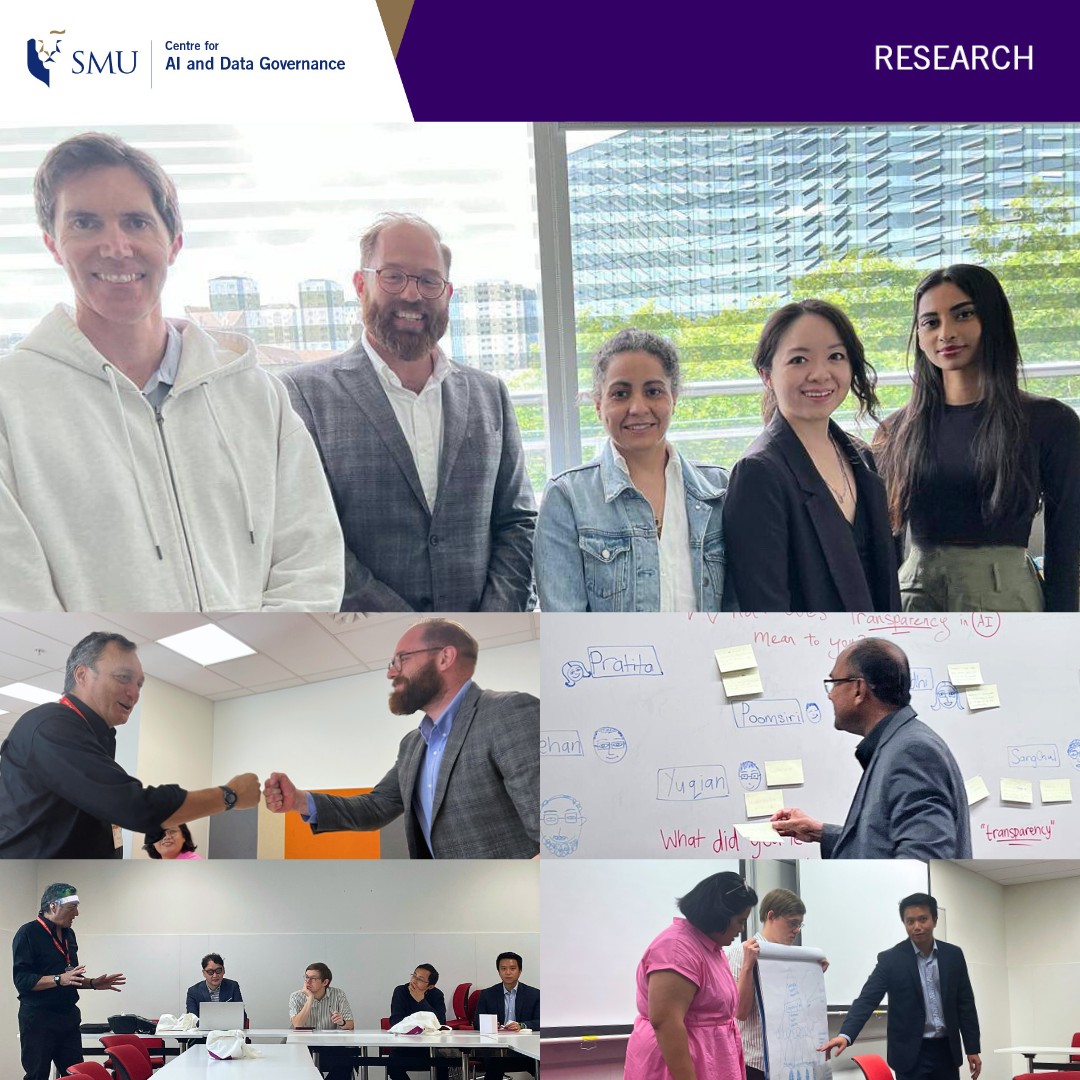Fairness with AI - 11 to 12 March 2024

On 11-12 March 2024, SMU CAIDG co-organised a workshop on "Fairness with AI" with the Centre for Communication Governance (CCG), National Law University Delhi. The workshop took place under the auspices of the SMU-Microsoft Asian Dialogues on AI Governance which aim to foster an exchange of views and deepen research collaboration across the Asia-Pacific region. This workshop follows on from a series of workshops that examines how ethical principles, such as accountability, fairness and transparency, can be applied and operationalised in the regulation of AI technologies across jurisdictions.
We thank all our participants who have enriched our workshop with their perspectives and contributions. We look forward to our next workshop and the continued engagement of our valued dialogue members. We would also like to offer special thanks to our co-organisers at CCG for their support throughout the event planning process and for being wonderful hosts.
Transparency in AI - 27 to 28 November 2023

On 27-28 November 2023, the Centre for AI and Data Governance (CAIDG) co-organised a workshop on "Transparency in AI" with The University of Auckland (UoA). The workshop took place under the auspices of the SMU-Microsoft Asian Dialogues on AI Governance, and is part of a series of workshops that examines how ethical principles such as accountability, fairness and transparency, can be applied and operationalised in the regulation of AI technologies. This workshop follows from our previous workshop on AI Accountability in Smart Cities, which was held in Singapore in April earlier this year.
The workshop commenced with welcome remarks by Jason Grant Allen, CAIDG’s Director, followed by Jane Loo’s (CAIDG Senior Research Associate and Adjunct Faculty) opening address on the limitations of the transparency ideal and Nadia Dabee's (Senior Lecturer, UoA) presentation on transparency in Employment Law. The participants then each gave a 10-minute presentation on transparency as an AI and data governance mechanism, based on their research interests. The presentations were diverse and explored the principle of transparency from both a technical and comparative lens, including how it is being applied in different jurisdictions and industries.
In the afternoon, the participants split into smaller groups to further discuss the principle of transparency based on three main categories: (1) The concept of transparency in AI for good governance, (2) The comparative dimensions of transparency in AI and (3) Transparency mechanisms and operationalising transparency in AI, before reconvening to share their ideas with the wider group. The first day concluded with participants writing their brief thoughts on what they learnt about the concept of transparency from the workshop on post-it notes.
On the second day, the participants engaged with two hypothetical scenarios, one located in the gig economy and the other in the healthcare sector, investigating transparency issues and obligations in each case. The workshop then concluded with closing remarks by Jason and Nadia, before the participants networked over lunch.
The dialogues aim to foster an exchange of views and deepen research collaboration on the governance of AI in the Asia-Pacific region, which we have certainly achieved over the fruitful 1.5 days. We would like to express our deepest gratitude and appreciation to all our participants who have enriched our workshop with their perspectives and contributions. We look forward to the continuation of our workshop series in the following year, and the continued engagement of our valued dialogue members.
AI Accountability in Smart Cities - 24 to 25 April 2023
On 24-25 April 2023, the Centre for AI and Data Governance (CAIDG) organised the "AI Accountability in Smart Cities" workshop at our Yong Pung How School of Law. This was the first in-person workshop that we ran since Covid-19 started about 3 years ago.
The provision of AI-enabled smart city services is often enabled by the private sector, and is generally supported by mass data collection, surveillance and algorithmic predictions. A broader understanding of “AI governance” is needed to address this ongoing trend, and a deeper engagement with the concept is needed in order to understand the governance of AI in private and hybrid contexts. Where services in smart city initiatives are provided by the private sector, how do we ensure democratic governance and protect the values of accountability, transparency, and people-centered development?
Accountability for AI-enabled services is an important strand of AI governance. These discussions on AI accountability, however, are not always anchored in the context of the city. How do we define accountability, and why does it matter how we define it? Who is accountable to whom, and for what? A key challenge for AI governance lies in algorithmic systems (and ecosystems), where changing opportunities may lead to function creep, raising new accountability questions that may not have been perceived or addressed during projects’ inception.
A scoping exercise - 16 January 2020

The first roundtable was hosted by SMU SOL and CAIDG on 16 January 2020. In this kick-off meeting, participants discussed broad thematic focus areas that have been shared previously with Microsoft and academic partners. These topics represent an initial scoping exercise, led by SMU’s CAIDG, with input from the participants. The themes are representative of the key opportunities and issues in the space, and a reasonable starting point for the dialogues,
Thus, the initial roundtable meeting provided space for further refinement and fleshing out of the themes. The themes discussed and a report of the event are available here.
In the following roundtables, participants will present more specific topics related to AI Governance in order to tackle the most pressing issues facing governments, industry and other stakeholders in Asia.
The Dialogue will optimize for the convergence of key topics in the field, the expertise of the partners themselves, and the power of their networks and institutions.
Last updated on 01 Apr 2024 .